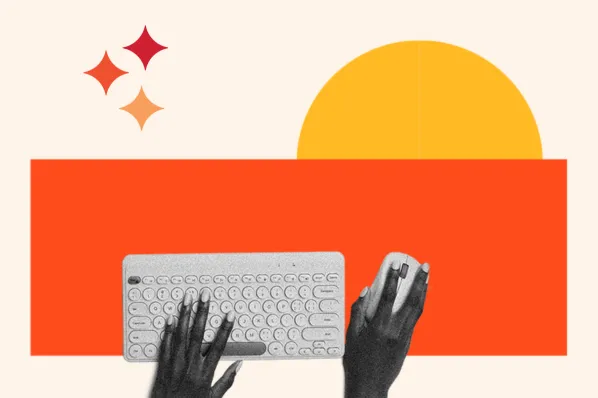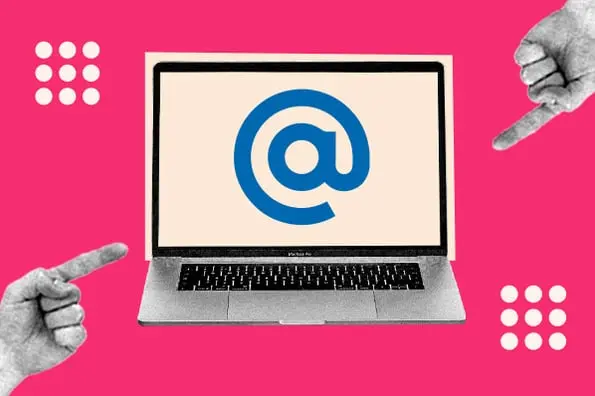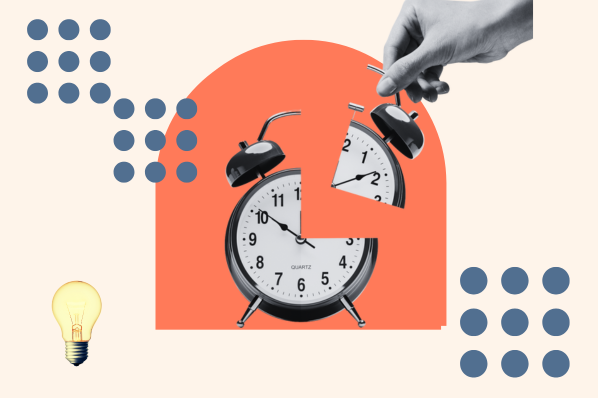Productivity is on the minds of almost every marketer, but what is productivity? How do you know if your idea of productivity aligns with that of your company or teams? Why is it necessary, and what can you do to be more productive?

In this article, we're going to explore productivity, what it means, and why you should care.
What is productivity?
Dictionary.com defines productivity as “the quality, state, or fact of being able to generate, create, enhance, or bring forth goods and services.” In an economic context, the meaning is similar — it’s essentially a measure of the output of goods and services available for monetary exchange.
However, productivity can mean something different when applied to our personal and professional lives. According to Friday.app, a productivity management tool, productivity is how efficiently you can consistently complete tasks that are important to you.
For many people, productivity can mean checking off everything on their daily to-do list. For others, productivity can be about getting more done in shrinking amounts of time. No matter your goals, you want to avoid "toxic productivity." Toxic productivity is the desire to be constantly productive, no matter the cost.
Fortunately, it's possible to strike a healthy balance and be productive without overdoing it.
How to be More Productive
If you're struggling to complete your tasks or you want to become more efficient, here are some ways to be more productive both inside and outside the office.
Stop multitasking.
It's a common misconception that multitasking can boost productivity because it entails working on multiple tasks simultaneously. However, according to most recent studies, only a tiny percentage of people can multitask effectively because the human brain can only focus on one task at a time, according to studies.
Multitasking causes our brains to divide attention between different tasks, which can lead to more mistakes being made and a lower-quality performance. Instead, try grouping similar tasks together and completing them one by one.
Schedule breaks.
There have been times when I've gotten so engrossed in a project that I accidentally skipped lunch or worked exceptionally late into the evening. While putting in more hours or skipping meals may create more time for productivity, the reality is that your body needs fuel and time to recharge.
Schedule breaks during or between tasks, and use that time to eat lunch, walk, stretch, meditate, or rest.
Set boundaries.
You must be comfortable saying 'no' to boost and maintain productivity. It's great to be helpful whenever possible, but you should say 'no' to last-minute requests, impromptu phone calls, or any plans to set you back on your progress.
Otherwise, you can slow your workflow by taking on too many responsibilities from others.
Design your workspace to optimize productivity
Whether you work from home or at an office, your workspace needs to be designed for productivity. This can be as simple as designating your workspace as a "no-phone zone" or quiet room. You want your work area to be comfortable, free of distractions, and equipped with the materials you need to complete your tasks — such as a computer, desk, comfy chair, pens, paper, etc.
Why Productivity is Important
At a company level, productivity leads to growth and high profits — making the organization more competitive in the marketplace. At an individual level, it boosts morale because it feels good to check everything off your to-do list. Knowing you've completed all your tasks early with time to spare for leisure is nice.
Productivity Examples
Here are some examples of how you can be productive:
Break larger projects into smaller tasks.
Trying to complete a massive project all at once can be daunting, and the intimidation of it can stop you in your tracks and slow production. Instead, look at the project's different components and find ways to break it down into smaller tasks you can complete over time.
Develop healthy habits.
Healthy habits are a great way to be productive because they foster consistency. For example, working out and eating a nutritious breakfast every morning will ensure you consistently have the energy to tackle your daily tasks.
Create a daily to-do list prioritizing the most important tasks
Before starting your day, create a to-do list with your most essential duties posted at the top. If you are at a loss for what to do during your day or are unsure what to do next, look to your to-do list.
Productivity is different for everyone, so check in with your team to ensure everyone's productivity goals align. And if you struggle to complete your tasks, you know how to keep yourself on track.
Editor's Note: This blog post was originally published in January 2017, but was updated in July 2020 for comprehensiveness and freshness.

![Download Now: How to Be More Productive at Work [Free Guide + Templates]](https://no-cache.hubspot.com/cta/default/53/be08853d-7ccb-4ab6-ba13-ef66a1d9b4ff.png)






![How to Delete Your Instagram [Easy Guide]](https://blog.hubspot.com/hubfs/delete-instagram.png)
![Millennials vs. Gen Z: Why Marketers Need to Know the Difference [New Data]](https://blog.hubspot.com/hubfs/millenials%20vs%20gen%20z%20what%20marketers%20need%20to%20know%20when%20trying%20to%20reach%20each%20generation.jpg)

